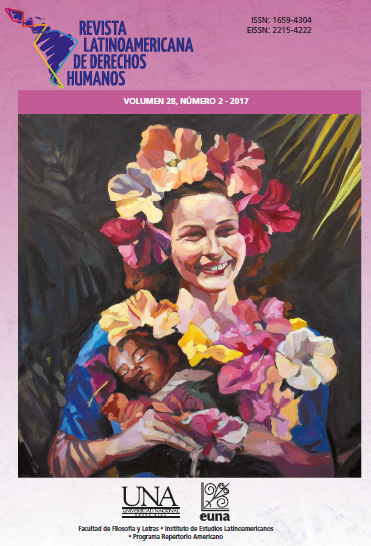Human Rights, Culture, and Literature. An Example in the Narrative of Latin American Social Criticism
DOI:
https://doi.org/10.15359/rldh.28-2.4Keywords:
human rights, public sphere, culture, Latin American literature, narrative of social criticism, nation-stateAbstract
Following the theoretical proposal of Amartya Sen to consider human rights as demands of an ethical nature, capable of articulating a particular type of moral reciprocity, the article proposes to deepen the idea of human rights as cultural artifacts inseparable from the public sphere and from their logic of creation and legitimization of political and social identities. To do this, the paper adopts the advances of a recent field of research exploring the relation between literature and human rights, and discusses their possibilities for the case of Latin American literature. Through the analysis of four novels, belonging to the social criticism narrative in the middle of the twentieth century, the article shows the way in which the literary discourse has been involved in the promotion and expansion of human rights, and in the defense of new subjects of rights. When studying the way in which these fictions build arguments in favor of the expansion of the political space and of a more equitable reorganization of the national community, the article dares to contribute to a better understanding of both the way in which human rights are integrated and consolidated in other discourses, and the key role that literature claimed to have in the construction of a democratic ethics in the Latin American national states.References
Agamben, G. (2006). Homo Sacer. El poder soberano y la nuda vida. Valencia: Pre-Textos.
Alegría, C. (1973). El mundo es ancho y ajeno. Buenos Aires: Losada.
Bystrop, K. (2012). Literature and Human Rights. En T. Cushman (Ed.), Handbook of Human Rights (pp 637-646). London and New York: Routledge. https://doi.org/10.1353/hrq.2012.0060
Chushman, T (Ed.). (2012). Handbook of Human Rights. London and New York: Routledge.
Cornejo Polar, A. (1980). La novela indigenista. Lima: Lasontay.
Cornejo Polar, A. (1994). Escribir en el aire. Ensayo sobre la heterogeneidad socio-cultural en las literaturas andinas. Lima: Horizonte.
Dawes, J. (2007). That the World May Know. Bearing Witness of Atrocity. Cambridge: Harvard University Press. https://doi.org/10.4159/9780674030275
Douzinas, C. (2009). A Humanities of Resistance. Fragments for a Legal History of Humanities. En A. Sarat et al. (Eds.), Law and the Humanities. An Introduction (pp.49-72). UK: Cambridge University Press. https://doi.org/10.1017/CBO9780511657535.002
Forcinito, A. (2014). Layers of Memory and the Discourse of Human Rights: Artistic and Testimonial Practices in Latin America and Iberia. Hispanic Issues On Line, (14), 1-17.
Forcinito, A. y Ordóñez, F. (2009). Human Rights and Latin American Cultural Studies. Hispanic Issues On Line, (4.1), 1-13.
Gros Espiell, H. (2002) El constitucionalismo latinoamericano y la codificación en el siglo XIX. Anuario Iberoamericano de Justicia Constitucional, (6), 143-176.
Guaraglia, M. (2012). Literatura y pensamiento político. La invención del ‘pueblo’ en la narrativa de denuncia social latinoamericana. Madrid: CSIC.
Hunt, L. (2009). La invención de los derechos humanos. Barcelona: Tusquets Editores.
Ignatieff, M. (2003). Los derechos humanos como política e idolatría. Barcelona: Editorial Paidós.
Kaminsky, A. (2009). Densely Woven Skeins. When Literature is a Practice of Human Rights. Hispanic Issues On Line, (4.1), 44-57.
Moraña, M. y Campos, J. (Eds.). (2006). Ideología y Literatura. Homenaje a Hernán Vidal. Pittsburgh: Instituto Internacional de Literatura Iberoamericana.
Moyn, S. (2010). The Last Utopia. Human Rights in History. Cambridge, Massachusetts and London: Harvard University Press.
Olson, G. (2010). De-Americanizing Law and Literature Narratives: Opening up the Story. Law&Literature, 22(2), 338-364. https://doi.org/10.1525/lal.2010.22.2.338
Rama, A. (1989). Transculturación narrativa en América Latina. Montevideo: Fundación Ángel Rama.
Remedi, G. (2009). ¿Esqueletos en el ropero? Los derechos humanos desde la cultura. Cuadernos del Claeh, 31(1-2), 41-67.
Roa Bastos, A. (2008). Hijo de hombre. Barcelona: Random-House Mondadori.
Sáenz, J. (2014). Literatura y derechos humanos: un campo naciente. Derecho y Ciencias Sociales, (10), 24-55.
Sarat, A., Anderson, M. y Frank, C. (Eds.). (2010). Law and the Humanities. An Introduction. UK: Cambridge University Press. https://doi.org/10.1177/1743872109348966
Schaffer, K. y Smith, S. (2004). Human Rights and Narrated Lives: the Ethics of Recognition. New York, Basingstoke: Palgrave Macmillan. https://doi.org/10.1057/9781403973665
Scorza, M. (2002). Redoble por Rancas. Madrid: Editorial Cátedra.
Sen, A. (2004). Elements for a Theory of Human Rights. Philosophy and Public Affairs, 32(4), 315-355. https://doi.org/10.1111/j.1088-4963.2004.00017.x
Slaughter, J. (2007). Human Rights Inc. The World Novel, Narrative Form and International Law. New York: Fordham University Press. https://doi.org/10.5422/fordham/9780823228171.001.0001
Smith, S. (2012). Cultures of rescue and the global transit in Human Rights Narratives. En T. Cushman (Ed.), Handbook of Human Rights (pp.625-636). London and New York: Routledge.
Sommer, D. (1991). Foundational Fictions: the National Romances in Latin America. Barkeley, Los Ángeles, London: Cambridge University Press.
Stone Peter, J. (2005). Law, Literature and the Vanishing Real: On the Future of an Interdisciplinary Illusion. PMLA, 20(2), 442-453. https://doi.org/10.1632/003081205X52383
Swanson Goldberg, E. y Schultheis Moore, A. (2012). Theoretical Perspectives on Human Rights and Literature. New York: Routledge.
Vidal, H. (1986). El movimiento contra la tortura Sebastián Acevedo. Derechos humanos y la producción de símbolos nacionales bajo el fascismo chileno. Minneapolis: Institute for the Study of Ideology and Literature.
Vidal, H. (1989). Cultura nacional chilena. Crítica literaria y derechos humanos. Literatura y Derechos Humanos, (5). Minneapolis: Institute for the Study of Ideology and Literature.
Vidal, H. (1994). Crítica literaria como defensa de los derechos humanos: cuestión teórica. Newark, Delaware: Juan de la Cuesta.
Vidal, H. (1997). Política cultural de la memoria histórica. Derechos humanos y discursos culturales en Chile. Santiago de Chile: Mosquito Editores.
Vidal, H. (2009). The Gravitation of Narratives of National Identity on Human Rights: the Case of Chile. Hispanic Issues On Line, (5), 73-81.
Zapata Olivella, M. (1990). Chambacú, corral de negros. Bogotá: Biblioteca Didáctica Anaya-Rei.
Downloads
Published
How to Cite
Issue
Section
License
El material que se publica en esta Revista está bajo una licencia “Creative Commons” 3.0 Costa Rica (CC, Reconocimiento-NoComercial-SinObraDerivada 3.0 Costa Rica (CC BY-NC-ND 3.0 CR) . Esto significa que el material publicado en la revista se puede compartir (copiar y distribuir) en cualquier medio o formato considerando que se debe reconocer de forma adecuada la autoría del material y la fuente, no puede utilizarse con fines comerciales y no se aceptan las obras derivadas (remezclar, transformar o crear a partir del material).








